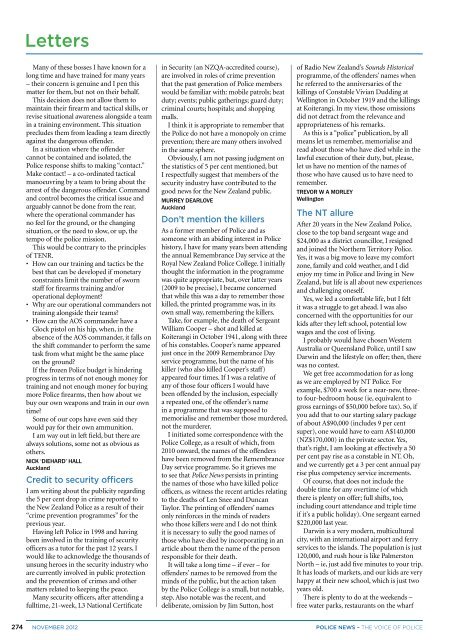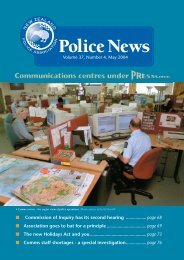2012-11 - New Zealand Police Association
2012-11 - New Zealand Police Association
2012-11 - New Zealand Police Association
You also want an ePaper? Increase the reach of your titles
YUMPU automatically turns print PDFs into web optimized ePapers that Google loves.
LettersMany of these bosses I have known for along time and have trained for many years– their concern is genuine and I pen thismatter for them, but not on their behalf.This decision does not allow them tomaintain their firearm and tactical skills, orrevise situational awareness alongside a teamin a training environment. This situationprecludes them from leading a team directlyagainst the dangerous offender.In a situation where the offendercannot be contained and isolated, the<strong>Police</strong> response shifts to making “contact.”Make contact! – a co-ordinated tacticalmanoeuvring by a team to bring about thearrest of the dangerous offender. Commandand control becomes the critical issue andarguably cannot be done from the rear,where the operational commander hasno feel for the ground, or the changingsituation, or the need to slow, or up, thetempo of the police mission.This would be contrary to the principlesof TENR.• How can our training and tactics be thebest that can be developed if monetaryconstraints limit the number of swornstaff for firearms training and/oroperational deployment?• Why are our operational commanders nottraining alongside their teams?• How can the AOS commander have aGlock pistol on his hip, when, in theabsence of the AOS commander, it falls onthe shift commander to perform the sametask from what might be the same placeon the ground?If the frozen <strong>Police</strong> budget is hinderingprogress in terms of not enough money fortraining and not enough money for buyingmore <strong>Police</strong> firearms, then how about webuy our own weapons and train in our owntime?Some of our cops have even said theywould pay for their own ammunition.I am way out in left field, but there arealways solutions, some not as obvious asothers.NICK ‘DIEHARD’ HALLAucklandCredit to security officersI am writing about the publicity regardingthe 5 per cent drop in crime reported tothe <strong>New</strong> <strong>Zealand</strong> <strong>Police</strong> as a result of their“crime prevention programmes” for theprevious year.Having left <strong>Police</strong> in 1998 and havingbeen involved in the training of securityofficers as a tutor for the past 12 years, Iwould like to acknowledge the thousands ofunsung heroes in the security industry whoare currently involved in public protectionand the prevention of crimes and othermatters related to keeping the peace.Many security officers, after attending afulltime, 21-week, L3 National Certificatein Security (an NZQA-accredited course),are involved in roles of crime preventionthat the past generation of <strong>Police</strong> memberswould be familiar with: mobile patrols; beatduty; events; public gatherings; guard duty;criminal courts; hospitals; and shoppingmalls.I think it is appropriate to remember thatthe <strong>Police</strong> do not have a monopoly on crimeprevention; there are many others involvedin the same sphere.Obviously, I am not passing judgment onthe statistics of 5 per cent mentioned, butI respectfully suggest that members of thesecurity industry have contributed to thegood news for the <strong>New</strong> <strong>Zealand</strong> public.MURREY DEARLOVEAucklandDon’t mention the killersAs a former member of <strong>Police</strong> and assomeone with an abiding interest in <strong>Police</strong>history, I have for many years been attendingthe annual Remembrance Day service at theRoyal <strong>New</strong> <strong>Zealand</strong> <strong>Police</strong> College. I initiallythought the information in the programmewas quite appropriate, but, over latter years(2009 to be precise), I became concernedthat while this was a day to remember thosekilled, the printed programme was, in itsown small way, remembering the killers.Take, for example, the death of SergeantWilliam Cooper – shot and killed atKoiterangi in October 1941, along with threeof his constables. Cooper’s name appearedjust once in the 2009 Remembrance Dayservice programme, but the name of hiskiller (who also killed Cooper’s staff)appeared four times. If I was a relative ofany of those four officers I would havebeen offended by the inclusion, especiallya repeated one, of the offender’s namein a programme that was supposed tomemorialise and remember those murdered,not the murderer.I initiated some correspondence with the<strong>Police</strong> College, as a result of which, from2010 onward, the names of the offendershave been removed from the RemembranceDay service programme. So it grieves meto see that <strong>Police</strong> <strong>New</strong>s persists in printingthe names of those who have killed policeofficers, as witness the recent articles relatingto the deaths of Len Snee and DuncanTaylor. The printing of offenders’ namesonly reinforces in the minds of readerswho those killers were and I do not thinkit is necessary to sully the good names ofthose who have died by incorporating in anarticle about them the name of the personresponsible for their death.It will take a long time – if ever – foroffenders’ names to be removed from theminds of the public, but the action takenby the <strong>Police</strong> College is a small, but notable,step. Also notable was the recent, anddeliberate, omission by Jim Sutton, hostof Radio <strong>New</strong> <strong>Zealand</strong>’s Sounds Historicalprogramme, of the offenders’ names whenhe referred to the anniversaries of thekillings of Constable Vivian Dudding atWellington in October 1919 and the killingsat Koiterangi. In my view, those omissionsdid not detract from the relevance andappropriateness of his remarks.As this is a “police” publication, by allmeans let us remember, memorialise andread about those who have died while in thelawful execution of their duty, but, please,let us have no mention of the names ofthose who have caused us to have need toremember.TREVOR W A MORLEYWellingtonThe NT allureAfter 20 years in the <strong>New</strong> <strong>Zealand</strong> <strong>Police</strong>,close to the top band sergeant wage and$24,000 as a district councillor, I resignedand joined the Northern Territory <strong>Police</strong>.Yes, it was a big move to leave my comfortzone, family and cold weather, and I didenjoy my time in <strong>Police</strong> and living in <strong>New</strong><strong>Zealand</strong>, but life is all about new experiencesand challenging oneself.Yes, we led a comfortable life, but I feltit was a struggle to get ahead. I was alsoconcerned with the opportunities for ourkids after they left school, potential lowwages and the cost of living.I probably would have chosen WesternAustralia or Queensland <strong>Police</strong>, until I sawDarwin and the lifestyle on offer; then, therewas no contest.We get free accommodation for as longas we are employed by NT <strong>Police</strong>. Forexample, $700 a week for a near-new, threetofour-bedroom house (ie, equivalent togross earnings of $50,000 before tax). So, ifyou add that to our starting salary packageof about A$90,000 (includes 9 per centsuper), one would have to earn A$140,000(NZ$170,000) in the private sector. Yes,that’s right, I am looking at effectively a 50per cent pay rise as a constable in NT. Oh,and we currently get a 3 per cent annual payrise plus competency service increments.Of course, that does not include thedouble time for any overtime (of whichthere is plenty on offer; full shifts, too,including court attendance and triple timeif it’s a public holiday). One sergeant earned$220,000 last year.Darwin is a very modern, multiculturalcity, with an international airport and ferryservices to the islands. The population is just120,000, and rush hour is like PalmerstonNorth – ie, just add five minutes to your trip.It has loads of markets, and our kids are veryhappy at their new school, which is just twoyears old.There is plenty to do at the weekends –free water parks, restaurants on the wharf274 november <strong>2012</strong>police news – the voice of police

















